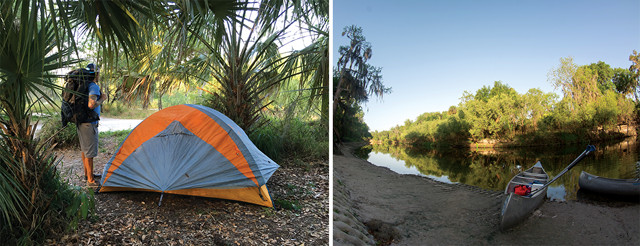
by Bethany Augliere Wednesday, February 13, 2019

Camping and canoeing are popular pastimes on Florida's Peace River. Credit: both: Bethany Augliere.
For travelers flying in from out of state, Florida has several major airports, including in Miami (MIA), Orlando (MCO) and Tampa (TPA), as well as numerous other options. Orlando is the most central large hub and may be the best option if you’re heading toward the state’s springs, which are concentrated in the north-central part of the state. For traveling to and between sites, a car is the best option.
For springs within state parks, the entrance fee is generally $6 per vehicle, plus additional fees if you’re camping. Entry to private springs is usually about $15, plus additional costs if you’re camping or renting gear to snorkel, dive or float down a river. Amenities vary by site.
Florida’s springs are typically less crowded in the winter, when the cooler air makes getting in and out of the water a bit less fun. I recommend wearing a wet suit at least 3 millimeters thick to stay warm. Winter is the most likely time to encounter manatees. However, if you are in a spring and manatees enter from the river, it is illegal to approach them under the Marine Mammal Protection Act and Endangered Species Act. The best thing to do is to just float motionless and practice passive observation. Some parks, like Blue Spring State Park, close access to springs in the winter for the sake of the manatees.
The best time to visit the Peace River for fossil hunting is usually in spring when the water level drops. Higher water levels make searching for the fossils difficult, since most people park their canoes when they find a good gravel spot to search, and then either sit or wade through the water scooping sand through their sifters.
Prepare to get wet while searching for fossils. The gravel can scrape up your legs and knees and the Florida sun will also bake your skin. I’d recommend wearing a sun shirt and long pants made of quick-drying material. Be sure to bring plenty of water for your canoe ride and a zip-close bag or something to stow your fossils in, as well as a change of clothes for after your hunt. Dogs are welcome in canoes, which is great if you are traveling with a furry family member.
If you want to collect vertebrate fossils, you must submit a permit application and pay a $5 fee in advance to the Florida Museum of Natural History. The permit is good for one year.
© 2008-2021. All rights reserved. Any copying, redistribution or retransmission of any of the contents of this service without the expressed written permission of the American Geosciences Institute is expressly prohibited. Click here for all copyright requests.